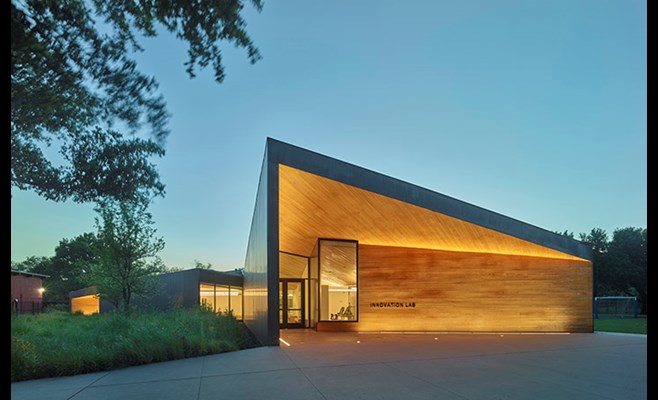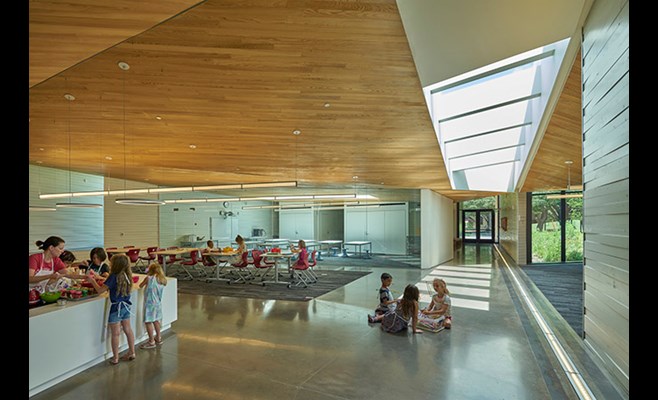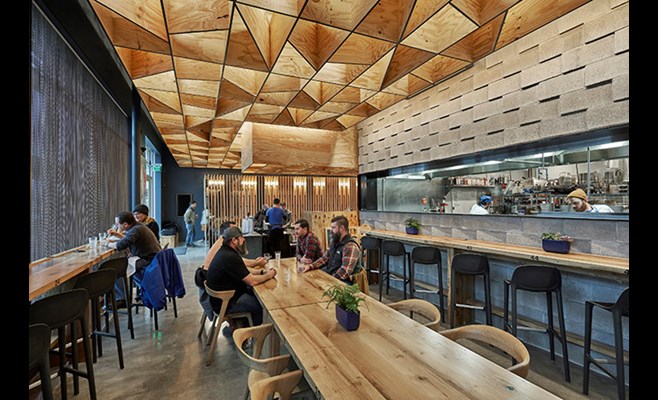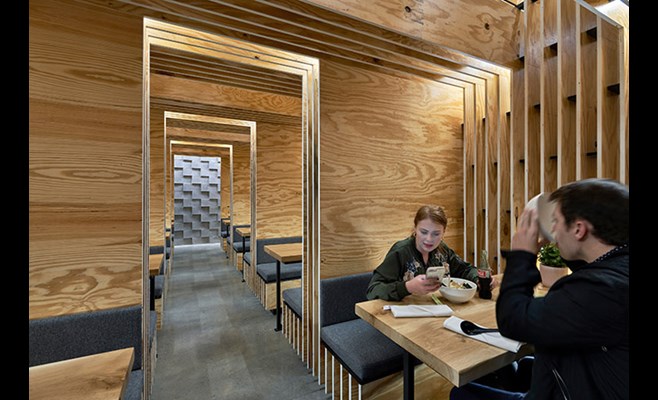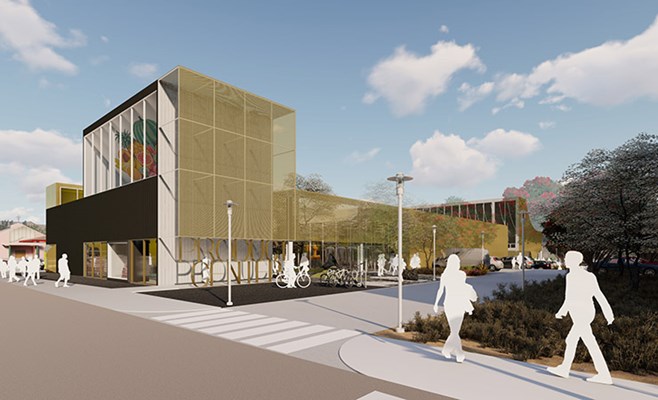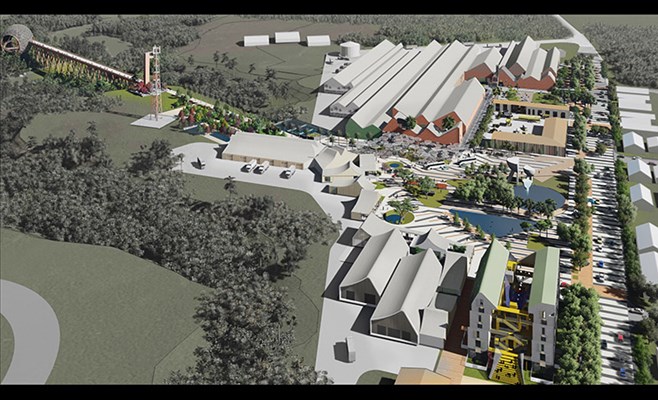
Three projects led by Fay Jones School of Architecture and Design faculty members have been recognized with accolades in three different categories of the American Institute of Architects' 2021 Honor Awards Program.
The AIA Honor Awards program is the top design awards program nationally for architecture, urban design and interior architecture. This year's award-winning projects will be celebrated this summer at the virtual AIA Annual Expo and Conference and featured in a forthcoming issue of Architect magazine, the official magazine of the AIA.
The Lamplighter School Innovation Lab, by Marlon Blackwell Architects, has won an Honor Award for Architecture, and the firm's CO-OP Ramen project has won an Honor Award for Interior Architecture. Rebuilding a Local Food Economy: Oahu, Hawaii, a project by the U of A Community Design Center in partnership with the U of A Resiliency Center, has won an Honor Award for Regional and Urban Design.
Marlon Blackwell, FAIA, is founder of his Fayetteville-based design practice, where he and Ati Johari Blackwell are both principals. He is a Distinguished Professor and the E. Fay Jones Chair in Architecture at the U of A. He received the 2020 Gold Medal from The American Institute of Architects, was named the 2020 Southeastern Conference Professor of the Year, and was elected to become a member of the American Academy of Arts and Letters earlier this year.
"In both of these projects, what we're attempting to do is enrich building typologies that are often either overdone or underdone," Blackwell said. "In the case of CO-OP, it's a very simple articulation of the ceiling using off-the-shelf plywood sheets with painted edges. And in the Lamplighter School, we're really trying to dignify the place of learning with a relatively simple palette and variation in the different spaces of learning. Each of these is responsive to their place and to the material culture of their place — both immediate to the site, but also to the region."
Stephen Luoni is the director of the U of A Community Design Center, an outreach center of the Fay Jones School. Luoni is also a Distinguished Professor and the Steven L. Anderson Chair in Architecture and Urban Studies at the university.
"Hawaii is the world's most remote population center, yet it imports more than 90 percent of its food from the U.S. mainland, leading to various forms of food insecurity," Luoni said. "Our work with the state involves development of a middle market infrastructure of local farmers, processors, distributors, food businesses and wholesale markets lost in the wake of global agrifood supply chains. The island-wide food supply chain is structured around a 34-acre urban food hub complex, a university-based food innovation center and remote farm-based food micro-processing centers. The project uses design thinking to construct statewide policy, economic development and resource supply chains in a next-generation infrastructure that models community resiliency and lower carbon futures. Most importantly, we know that solving for complex problems gives us the opportunity to also create beautiful places."
The Lamplighter School Innovation Lab is one of 10 projects recognized in the 2021 Architecture Awards program, which "celebrates the best contemporary architecture and highlights the many ways buildings and spaces can improve lives," according to the AIA press release. When selecting this year's winners, the nine-member jury considered design achievement, including "a sense of place, purpose, history and environmental sustainability," the release states.
The Lamplighter School Innovation Lab in Dallas, Texas, is a state-of-the-art, 10,600-square-foot structure that includes a series of collaborative spaces specifically tailored to woodworking, chemistry and physics that prompt students to explore rather than rely on instruction.
The Innovation Lab is the center of a master plan started in 2014 for this private school that serves 450 pre-kindergarten through fourth-grade students in the North Dallas area. The school campus was designed in the 1960s by O'Neil Ford, the leading Texas proponent of the mid-century modern approach.
Wrapped in copper and featuring cypress wood planks outside and in, the Innovation Lab's material palette, both warm and refined, is at home among the original buildings. Inside, the typical cellular classroom arrangement is replaced by an open landscape that encourages exploration. Its porous nature allows students to flow between indoor classrooms and outdoor learning opportunities that are rooted in the local ecology, presenting students with ample opportunities to consider new ideas and experiment.
CO-OP Ramen is one of seven projects recognized in the 2021 Interior Architecture Awards program, which celebrates "the most innovative interior spaces," according to the AIA release. The five-member jury evaluated entries based on design achievement, including "sense of place and purpose, ecology and environmental sustainability and history."
CO-OP Ramen, located in the 8th Street Market in Bentonville, is a casual dining restaurant that embraces the Japanese concept of wabi-sabi, which celebrates the asymmetries and imperfections in rough and natural objects. The building materials are ordinary but made extraordinary through texture, pattern and light, supporting a union of roughness and refinement.
Two primary elements, plywood and concrete block, were used in the design. The double-sided finish plywood was selected for its variation and inconsistency in grain. Each piece of plywood has black or white painted edges, adding a touch of graphic refinement to the organic roughness of the material. Carefully laid concrete block walls surround the space, softened by a 12-foot-tall living green wall.
Rebuilding a Local Food Economy: Oahu, Hawaii is one of five projects recognized in the 2021 Regional and Urban Design Awards program, which recognizes the best in urban design, regional and city planning, and community development. The five-member jury considered how well each design addresses environmental, social and economic issues through sustainable strategies. This includes the "ability to collect and distribute resident renewable resources and energies, while enhancing quality of life and promoting social equity," the AIA release states.
The Rebuilding a Local Food Economy: Oahu, Hawaii project represents four years of work with the State of Hawaii Department of Agriculture's Agribusiness Development Corporation and its Aquaculture and Livestock Support Services, and Sen. Donovan Dela Cruz in the Hawaii State Legislature. The three projects covered under the award include the Whitmore Food Hub; the Wahiawa Value-Added Product Development Center for the Hawaii University System and designed in partnership with Urban Works, an architecture and urban design firm in Honolulu; and the Farm Base Yard Prototype.
This is the 13th AIA Honor Award the U of A Community Design Center has received; all have been in the Regional and Urban Design category. Marlon Blackwell Architects has received a total of 16 national AIA awards. These two latest awards bring the total AIA Honor Awards the firm has received to eight — across the categories of Architecture, Interior Architecture, and Regional and Urban Design.
Topics
Contacts
Michelle Parks, director of communications
Fay Jones School of Architecture and Design
479-575-4704, mparks17@uark.edu
